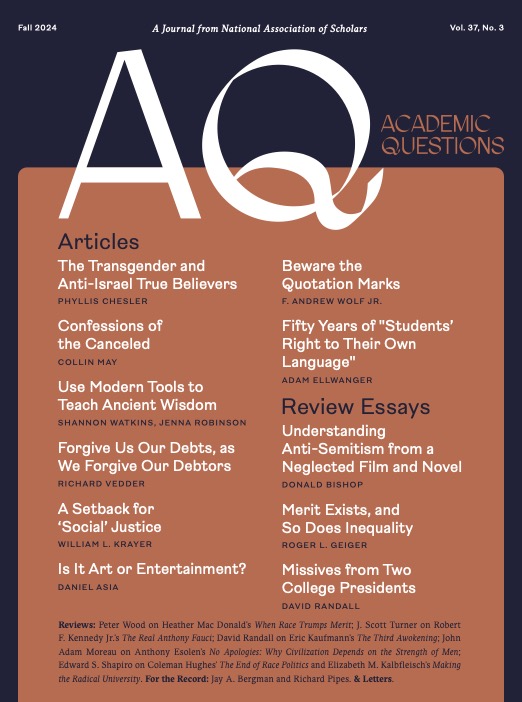Social Justice courses abound in American undergraduate and graduate schools, including law schools. They use such words and phrases as distributive justice, underrepresented, and activism. They purport to be concerned about all “disadvantaged” people, but the individual is often lost in the swarms of groups, races, and vague “marginalizing” of poorly defined victims by unnamed villains. Various alleged shortcomings in education, law enforcement and elsewhere are presented as systemic, which has led not only to courses labeled as social justice, but embedding its teachings in the entire range of university offerings so it cannot be avoided even in the traditionally most objective studies.
In his 1988 book The Fatal Conceit—The Errors of Socialism, Friedrich Hayek wrote that “social” now “increasingly supplants the word ‘good’ as a designation of morally right,” and “what at first seems a description imperceptibly turns into a prescription.” Hayek traced the term “social” to Bismarck and then to a group of German scholars who substituted “social policy” for political economy. Hayek went on to list “over one hundred and sixty nouns” qualified by the term “social” which he had recently encountered. For Hayek, none of these new phrases had any clear meaning. “Social justice,” despite its ubiquity, is a murky subject, but the 2023 Supreme Court has managed to give it a direct hit.
The “Nature of Things”
The year 1896 was one that saw increasing occurrences of “social” around the world, as Hayek observed. Here, it is used by Justice Henry Billings Brown in his majority opinion in the infamous Supreme Court case of Plessy v. Ferguson, which legitimized segregation and the concept of “separate but equal.”
The object of the Fourteenth Amendment was undoubtedly to enforce the absolute equality of the two races before the law, but, in the nature of things, it could not have been intended to abolish distinctions based upon color, or to enforce social, as distinguished from political, equality, or a commingling of the two races upon terms unsatisfactory to either.
Justice Brown saw two types of justice, social and political, which do not overlap. In Justice Brown’s jurisprudence, political justice, even that defined by the Constitution, cannot affect social justice. For Plessy, an “octaroon” living in 1890’s Louisiana, this meant he could not take a seat in the “white” part of public transportation despite the equal protection clause of the Fourteenth Amendment.
In the 1890’s and beyond, social justice has been proselytized in terms of groups, classes, and races, not individuals. Individuals, including those who check a box, are assigned to racial and ethnic groups. As announced by the Plessy court, political justice—that is, justice defined by law—must give way to social justice because it is not “in the nature of things.”
The twenty-first century ACLU agrees with Justice Brown. Here is its publicity release when it filed its amicus brief in the First Circuit Court of Appeals in the “Harvard case,” Students for Fair Admissions v. President and Fellows of Harvard College, on its way to the Supreme Court:
This case is not about educational equity or protecting the educational interests of a particular racial or ethnic group. It is instead just the latest attempt to advance the misguided arguments for race blindness, recycling the tired myth of a post-racial America. If you cannot acknowledge someone’s race, you risk not acknowledging them.
Tired Myths, Acknowledgment, and Stereotypes
Acknowledgment, in the ACLU’s lexicon, is not mere notice, but stereotyping. Its misguided position completely ignores the actual plaintiffs in the Harvard case and their well-substantiated complaint of unlawful discrimination. The ACLU and other affirmative action enthusiasts are stuck in Justice Brown’s world of “two races,” seemingly oblivious to Harvard’s sorting of admission applications by Black, Hispanic, Asian, and White in spite of the numerous differences of backgrounds and experience within each, and the occasional nod to Native Hawaiians (are they Native Americans?), Aleuts, Pacific Islanders, and the Inuit, and in spite of the rapidly increasing incidence of mixed races.
The ACLU’s dogma—that race blindness is a myth, that racism is everywhere in America, that it cannot be escaped—thrives in academia and has infected many other institutions including many public schools. It is not merely observed: it is promoted. Stereotyping is instilled in both children and adults.
In her dissent in Harvard, Justice Sotomayor addresses stereotyping by asserting: “Acknowledging that there is something special about a student of color who graduates valedictorian from a predominantly white school is not a stereotype.” Yes, it is. It says “Wow, I never thought a black person could do that.” It makes clear the acknowledger’s low expectations for “students of color.” The Supreme Court’s majority in the Harvard case now allows the valedictorian the dignity of recognition for accomplishment as a unique individual, untainted by surprisingly exceeding stereotypical expectations.
Opinions and Decisions
In his concurring opinion in Harvard, Justice Thomas, quoting the above passage from Justice Brown’s opinion, wrote that in Plessy, the Court’s view of the Fourteenth Amendment “reached its nadir.” Justice Sotomayor, apparently agreeing, calls Plessy a “shameful decision,” but she, and the left in general, also agree with Justice Brown’s opinion that the Fourteenth Amendment couldn’t possibly have been intended to mean what it actually says, because, after all, it is “in the nature of things” to acknowledge distinctions based upon color. Here, it should be noted that, in court cases, opinions are not decisions. It may well be that Justice Sotomayor realizes she agrees with Justice Brown’s opinion that it is in the nature of things to acknowledge race but does not agree with the result in the case—the decision that, therefore, it is okay for the State of Louisiana to compel segregation of public transportation. That, to Justice Sotomayor, is what makes Plessy “shameful.” But the six Justices of the majority in Harvard spell out that Plessy’s even greater shame is its complete rejection of the Fourteenth Amendment.
Plessy v Ferguson was about public transportation, but it was effectively overruled by Brown v Board of Education, which ended school segregation in 1954, seventy years ago. Without ever using the word “social,” Chief Justice Roberts’ lengthy majority opinion in Harvard reviews case after case following Brown v Board of Education, enforcing the Fourteenth Amendments equal protection clause in various aspects of American life, reinforced by the clear pronouncements of the Civil Rights Act of 1964. Justice Thomas’s own meticulous review in Harvard cites instance after instance of legislative intent for real equality. Justices Kavanaugh and Gorsuch add their own exclamation points. Justices Alito and Barrett could add no more.
Invictus
The newest member of the Court, Justice Ketanji Brown Jackson, also filed a dissent in the Harvard case, including the following:
As the Civil War neared its conclusion, General William T. Sherman and Secretary of War Edwin Stanton convened a meeting of Black leaders in Savannah, Georgia. During the meeting, someone asked Garrison Frazier, the group’s spokesperson, what “freedom” meant to him. He answered, “placing us where we could reap the fruit of our own labor, and take care of ourselves … to have land, and turn it and till it by our own labor.”
Today’s gaps exist because that freedom was denied far longer than it was ever afforded. Therefore, as Justice Sotomayor correctly and amply explains, UNC’s holistic review program pursues a righteous end—legitimate “because it is defined by the Constitution itself. The end is the maintenance of freedom.”
This rationale—that a “righteous” end—or, as Hayek would say, a moral end—justifies the means (affirmative action, in this case)—is unacceptable in all sorts of contexts, but especially in a Supreme Court opinion. It not only ignores the most relevant part of the Constitution, but also disrespects Mr. Frazier’s dignified response to the question: his definition of freedom is self-reliance. However carefully the University of North Carolina (co-defendant with Harvard) carried out its holistic affirmative action program, its intended beneficiaries—the ones who graduate—will always suffer from the suspicion that they did not fully earn their place at UNC. This air of suspicion is not ameliorated by accusations that others who grew up with various privileges or benefits did not fully earn their places. There are too many examples of success out of poverty and adverse circumstances in recent decades and far earlier. Few people are far from a public library, and all can, like Mr. Frazier, aspire to be their own master. For some Americans who are old enough to remember having read William Ernest Henley’s poem Invictus in grade school, it seems Mr. Frazier could have written it himself.
A “holistic review program” that includes race as a factor is an insult to all the applicants to Harvard and UNC. The best of those accepted will soon realize that the supposed prestige of attending such schools cannot be achieved by denying the individuality of one’s fellow students. In the long run, the best education is a matter of self-motivation and, in Chief Justice Roberts’ words, “challenges bested, skills built, and lessons learned”—as an individual.
A Change in Course?
Justice Harlan, dissenting in Plessy, wrote:
Our Constitution is color-blind, and neither knows nor tolerates classes among citizens. In respect of civil rights, all citizens are equal before the law. The humblest is the peer of the most powerful. The law regards man as man and takes no account of his surroundings or of his color when his civil rights as guaranteed by the supreme law of the land are involved.
Social justice, in the form of DEI (diversity, equity, and inclusion), has replaced “separate but equal” with “together but unequal.” But the 2023 Supreme Court has cleared the way to achieve Justice Harlan’s forthright statement of the law. No one needs to decide whether a Puerto Rican with a black great grandmother should be disqualified for a seat in the Hispanic part of the next Harvard class.
Until now, social justice classes no doubt included more activism than academic rigor, but after Harvard, students who still, for whatever reason, do not like equal protection under the law might focus on how actually to amend or even rescind the Fourteenth Amendment rather than to construe it into the meaninglessness of a tired myth. Schools then could rightfully change the name of the class from Social Justice to Constitutional Law.
Many of the best of Justice Brown’s generation lost arms, legs, and lives fighting “to make men free,” while he paid for a substitute in the Union Army, and later violated his oath of office by deliberately trashing the hard-won Fourteenth Amendment. The ACLU and the universities it defends seem to have no problem emulating Justice Brown.
Even Smart Moths Never Learn
Even though many highly competitive schools are rife with hypocrisy, plagiarism, and politicization, we can expect they will continue to attract large pools of applicants capable of very high SAT scores, seeking the fading prestige of simply being admitted. But as Thomas Sowell writes in the first sentence of Intellectuals and Society, “Intellect is not wisdom.” We may not expect wisdom in eighteen-year-olds, but real “challenges bested, skills built, and lessons learned” can be the Lego blocks of maturity. The problem will be to separate the authentic experiences from the fabricated ones. Honesty is fundamental.
Unfortunately, highly intelligent students, and their parents, can be capable of world-class cheating. Interviews could help to recognize the culprits, but there is good reason to doubt that any interviewer at Harvard will see a difference between truth and falsity. The idea that everyone is entitled to his or her own truth seems to be well established at Harvard.
While the total number of applications is drifting downward, we may expect that many practiced in artifice and cynicism will continue to be attracted, and accepted, to the Harvards of the world. A student body of such people will not make a fit environment for someone seeking a real education. An excellent first step for a student looking for a great place to study would be to search for a school that treats students as individuals, not stereotypes, and that does not view merit as a means of oppression. Such a student should be especially alert for schools that continue to espouse Justice Brown’s nineteenth-century bipolar justice by some newly contrived name.
A scheme that is already well advanced is the use of so-called disparate impact, by which any racial presence not in alignment with the general population or the demography of a certain region is presented as real evidence of real discrimination. This is a sidling of social justice into Constitutional law. This kind of erosion of equal justice under the law is enabled by assigning people to races in the first instance, but Harvard may provide the basis for abolishing boxes to check or otherwise designating race throughout the nation. Assigning people to races is an embrace of Justice Brown’s “nature of things.”
William L. Krayer was counsel to the Pittsburgh intellectual property law firm Beck and Thomas, P.C. before his retirement, and a past president of the Pittsburgh Intellectual Property Law Association; [email protected]. Krayer last appeared in AQ this past summer with his article “Critical Theory vs. ‘Most Modernism.’”
Photo by Aerial Mike on Adobe Stock














